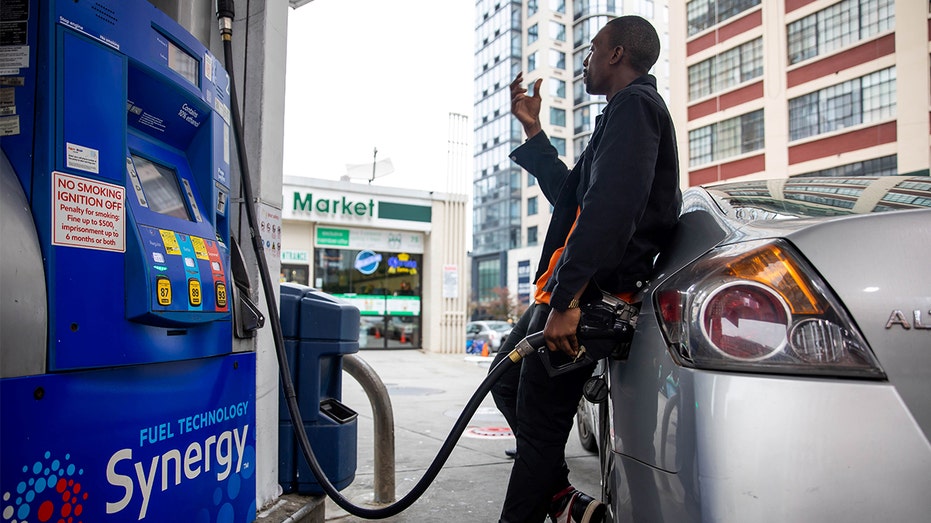[ad_1]
Lebenthal Global Advisors President Dominick Tavella discusses inflation and supply chain issues impacting the economy and his market outlook for 2022.
The latest measure of inflation is projected to show another eye-popping figure as the price of everyday consumer goods soared higher in November.
The Labor Department is releasing the highly anticipated consumer price index on Friday morning, providing a fresh look at just how hot inflation ran last month. Economists expect the gauge – which measures a bevy of goods ranging from gasoline and health care to groceries and rents – to show that prices surged 6.8% in November from the year-ago period, toppling the previous month’s 31-year high of 6.2%. On a month-to-month basis, economists forecast the index would rise by 0.7%.
It would mark the fastest increase in consumer prices since June 1982, when it hit 7.1%.
CONSUMER PRICES SURGE BY MOST IN 31 YEARS
Rising inflation is eating away at strong gains and wages and salaries that American workers have seen in recent months – bad news for President Biden, who has seen his approval rating plunge as consumer prices rose. The White House has blamed the price spike on supply-chain bottlenecks and other pandemic-induced disruptions in the economy, while Republicans have pinned it on the president’s massive spending agenda.
Biden looked to downplay the November inflation figure before its release, saying in a statement on Thursday that the data would not reflect the decline in gas prices. He stressed that passing his $1.7 trillion social spending and climate plan is necessary to help lower costs.

A driver fuels a car at a service station in New York City, Oct. 13, 2021. (Getty Images / Getty Images)
“Fortunately, in the weeks since the data for tomorrow’s inflation report was collected, energy prices have dropped,” Biden said in a statement. “The information being released tomorrow on energy in November does not reflect today’s reality, and it does not reflect the expected price decreases in the weeks and months ahead, such as in the auto market.”
A higher-than-expected reading could imperil the passage of the Build Back Better bill, however: Sen. Joe Manchin raised concerns this week about soaring inflation and refused to commit to supporting his party’s massive social spending and climate plan.
During a Wall Street Journal CEO Council Summit, Manchin, D-W.Va., expressed alarm about the state of the economy after the government reported last month that inflation hit a 31-year high. He maintained that he’s waiting to see the final text of the $1.7 trillion spending plan before making a decision.
“The unknown we’re facing today is much greater than the need that people believe in this aspirational bill that we’re looking at, and we’ve got to make sure we get this right,” Manchin said. “We just can’t continue to flood the market, as we’ve done.”
The reading will also have major implications for the Federal Reserve. Though central bank policymakers largely downplayed rising as “transitory” and likely to abate as supply-chain disruptions cleared up, Chair Jerome Powell shifted his tone last week while testifying before Congress.

David Cruise discusses artificial Christmas trees with a saleswoman at the Balsam Hill showroom in Burlingame, California, Nov. 19, 2021. (Associated Press / AP Newsroom)
He told lawmakers that it was time to “retire” the word transitory – partly due to different interpretations of what the word means – and suggested that Fed officials may speed up their withdrawal of pandemic support for the economy.
GET FOX BUSINESS ON THE GO BY CLICKING HERE
“At this point, the economy is very strong, and inflationary pressures are high,” Powell said last week. “It is therefore appropriate in my view to consider wrapping up the taper of our asset purchases, which we actually announced at our November meeting, perhaps a few months sooner.”
That could mean the Fed’s bond-buying program ends sooner than expected, potentially leading to a faster-than-expected interest rate hike. The central bank has been purchasing $120 billion in bonds each month throughout most of the pandemic in order to keep credit cheap and stabilize the financial markets. In November, Fed officials announced plans to scale back the program by $15 billion a month, a timeline that would end the program by late June.
[ad_2]
Read More: US inflation likely surged to new record in November
